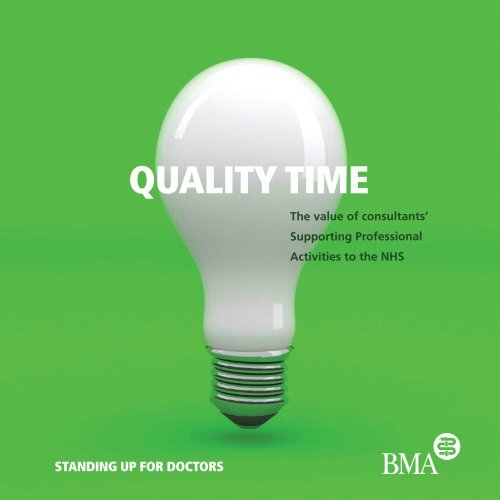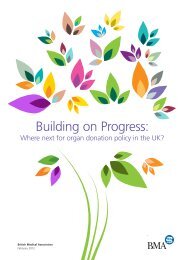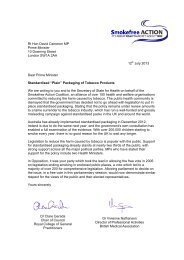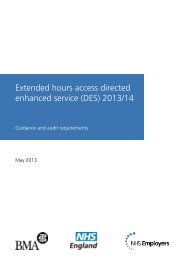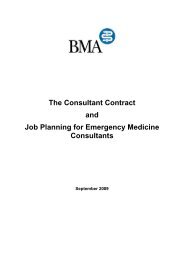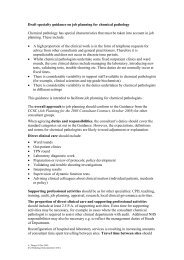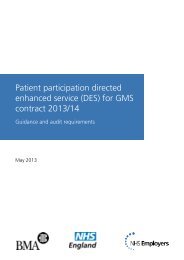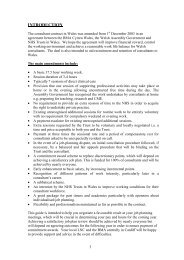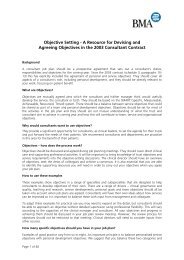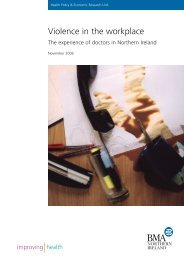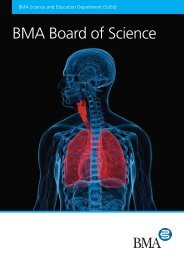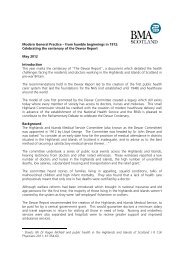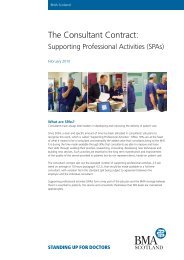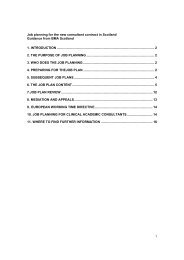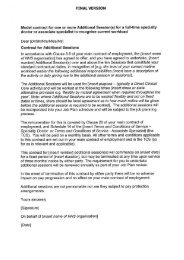Quality time: The value of consultants - BMA
Quality time: The value of consultants - BMA
Quality time: The value of consultants - BMA
You also want an ePaper? Increase the reach of your titles
YUMPU automatically turns print PDFs into web optimized ePapers that Google loves.
QUALITY TIME<br />
STANDING UP FOR DOCTORS<br />
<strong>The</strong> <strong>value</strong> <strong>of</strong> <strong>consultants</strong>’<br />
Supporting Pr<strong>of</strong>essional<br />
Activities to the NHS
Foreword<br />
Dr Mark Porter, FRCA<br />
Chairman <strong>of</strong> the<br />
Consultants Committee<br />
British Medical Association<br />
1 King’s Fund (2009) Choice at the Point <strong>of</strong> referral – Early results <strong>of</strong> a patient survey. London: King’s Fund. 04.11.10<br />
www.kingsfund.org.uk/publications/choice_at_the_point.html<br />
QUALITY TIME<br />
Consultants are <strong>value</strong>d by their patients for many reasons, but foremost among these is the quality <strong>of</strong> care<br />
for which they are responsible. This is why it is an essential part <strong>of</strong> a consultant’s job to spend <strong>time</strong> thinking<br />
about how to make their services better – to take advantage <strong>of</strong> the latest scientific developments, to learn<br />
from proven innovations, to develop their skills, to extend scientific knowledge, to audit services for safety<br />
and quality, and to train others. Patients look to us not just to provide care, but also to lead and develop it.<br />
However, the <strong>time</strong> in which <strong>consultants</strong> can undertake such work is now under serious threat. NHS<br />
organisations, increasingly squeezed financially and having to achieve more with less, are trying to reduce<br />
<strong>consultants</strong>’ Supporting Pr<strong>of</strong>essional Activities (SPAs) in a search for ‘efficiency’. At its worst this can lead to<br />
pressure to treat patients as units <strong>of</strong> production rather than individuals engaged in a difficult journey at a<br />
testing <strong>time</strong>.<br />
We also believe it represents a false economy. As many <strong>of</strong> the examples here show, when <strong>consultants</strong> have<br />
<strong>time</strong> to reflect on services and improve them, they frequently save the taxpayer significant sums <strong>of</strong> money.<br />
<strong>The</strong> NHS has been tasked with saving £20 billion by 2014, but this already Herculean challenge will become<br />
even harder if staff are denied <strong>time</strong> to stand back and consider ways <strong>of</strong> working more efficiently.<br />
Preventing <strong>consultants</strong> from spending <strong>time</strong> on anything other than direct clinical care would represent a<br />
betrayal <strong>of</strong> what patients deserve from the NHS. Research shows very clearly that patients <strong>value</strong> quality <strong>of</strong><br />
care very highly, and expect it to be delivered in all NHS organisations, not just a few centres <strong>of</strong> excellence. 1<br />
We have gathered together here just a handful <strong>of</strong> examples <strong>of</strong> the work <strong>consultants</strong> undertake during their<br />
SPA <strong>time</strong> – ordinary <strong>consultants</strong> providing extraordinary services for patients throughout the UK.<br />
Dr Mark Porter, FRCA<br />
Chairman <strong>of</strong> the Consultants Committee<br />
British Medical Association<br />
<strong>BMA</strong> – <strong>Quality</strong> <strong>time</strong> 1
2<br />
<strong>BMA</strong> – <strong>Quality</strong> <strong>time</strong>
What are SPAs?<br />
2 <strong>BMA</strong> (2010) NHS at risk <strong>of</strong> ’stagnating‘ as <strong>BMA</strong> survey shows cuts to <strong>consultants</strong>’ <strong>time</strong> to develop services. London: <strong>BMA</strong>. 02.06.10<br />
http://web2.bma.org.uk/pressrel.nsf/wlu/SGOY-85ZDDL?OpenDocument<br />
3 Santry, Charlotte (2010) NHS Trusts issue wake-up call on consultant productivity. Health Service Journal. 15.04.10<br />
www.hsj.co.uk/news/workforce/nhs-trusts-issue-wake-up-call-on-consultant-productivity/5013540.article<br />
QUALITY TIME<br />
Under their standard NHS contract, full-<strong>time</strong> NHS <strong>consultants</strong> should typically have 10 hours (out <strong>of</strong><br />
a standard 40-hour week) available for Supporting Pr<strong>of</strong>essional Activities (SPAs). SPA <strong>time</strong> allows<br />
<strong>consultants</strong> to undertake a wide range <strong>of</strong> work, including the development <strong>of</strong> new services, research,<br />
clinical governance, training, and management. <strong>The</strong> remaining 75 per cent <strong>of</strong> <strong>consultants</strong>’ <strong>time</strong> is<br />
spent on direct clinical care. Variation from this standard split is subject to agreement between the<br />
employer and the individual consultant.<br />
A UK-wide <strong>BMA</strong> survey <strong>of</strong> over 2,000 NHS <strong>consultants</strong> published in June 2010 indicated widespread<br />
cuts to the <strong>time</strong> available for such activities. 2 Over a fifth (21%) said the number <strong>of</strong> SPAs in their job<br />
plan had been reduced since they transferred to the new consultant contract in 2004, or since they<br />
started. Only 7 per cent said the number <strong>of</strong> SPAs had increased. More than one in seven (15.1%) said<br />
their employer had reduced the standard number <strong>of</strong> SPAs for all <strong>consultants</strong>, and almost a quarter<br />
(23.8%) said their employer had reduced SPAs for newly appointed <strong>consultants</strong>. Nearly two thirds<br />
(65.4%) said the decrease to their SPA <strong>time</strong> was employer-driven. Areas identified as having already<br />
been affected by reductions, or at risk <strong>of</strong> being affected in future, included the training <strong>of</strong> junior<br />
doctors and Continuing Pr<strong>of</strong>essional Development (CPD).<br />
A separate Freedom <strong>of</strong> Information request in April 2010 found that a fifth <strong>of</strong> Trusts in England had<br />
reduced or planned to reduce SPA <strong>time</strong>. 3<br />
<strong>BMA</strong> – <strong>Quality</strong> <strong>time</strong> 3
Dr Idris Baker<br />
Consultant in Palliative Medicine<br />
Morriston Hospital, Swansea<br />
4<br />
Patients who get the right specialist care at the early stages <strong>of</strong> a life-limiting illness not only have higher<br />
quality <strong>of</strong> life but also survive longer. Yet access to palliative care on the NHS can be patchy, and is not<br />
always equitable. In his SPA <strong>time</strong>, Idris Baker who provides clinical leadership for the palliative care team at<br />
the Abertawe Bro Morgannwg University Health Board (ABM) in Swansea, Neath<br />
Port Talbot and Bridgend, has worked on an initiative that has resulted in more<br />
people benefiting from the care they need towards the end <strong>of</strong> life.<br />
I can’t see how the NHS can<br />
improve services without<br />
the input <strong>of</strong> senior doctors,<br />
as well as lots <strong>of</strong> other<br />
people. Having that<br />
engagement doesn’t come<br />
without <strong>time</strong>. You can’t do<br />
it in five minutes<br />
<strong>BMA</strong> – <strong>Quality</strong> <strong>time</strong><br />
Initially, ABM’s palliative care service provided care to people with cancer, but<br />
when staff conducted a review they concluded it was unfair that the needs <strong>of</strong><br />
other patients were not being met: ‘We’d come across patients in adjacent<br />
hospital beds, with frankly very similar problems, in terms <strong>of</strong> scale and nature,’<br />
Dr Baker says. ‘<strong>The</strong>re were a lot <strong>of</strong> people who were breathless because <strong>of</strong> lung<br />
cancer, and a lot who were breathless because <strong>of</strong> pulmonary fibrosis. <strong>The</strong>y had<br />
similar symptom severity, but because <strong>of</strong> the diagnosis they had, we were saying<br />
“I’ll have you, but not you”. We decided we had to reduce that kind <strong>of</strong> arbitrary<br />
inequity.’ As a result <strong>of</strong> the review, the team turned a cancer-only palliative care<br />
service into one that provides care on the basis <strong>of</strong> need rather than diagnostic<br />
labels. And although out-<strong>of</strong>-hours access has also improved, there has been<br />
minimal additional cost to the NHS.<br />
<strong>The</strong> review also yielded ideas for improving integration between services, making<br />
palliative care more central to the work <strong>of</strong> doctors in other specialties. As well<br />
as providing advice to colleagues on problems such as how to control their<br />
patients’ symptoms, Dr Baker’s team can <strong>of</strong>fer tips on ‘short-cutting the<br />
bureaucratic nightmares’ they encounter when trying to arrange care at home for their patients, and is<br />
about to go live with an email advice service for GPs with questions about palliative care. Dr Baker says his<br />
colleagues have welcomed the additional support. ‘<strong>The</strong> fact is that most <strong>of</strong> surgeons’ experience and training<br />
isn’t so closely focused on how you meet the social care needs <strong>of</strong> someone with an inoperable disease. If<br />
you’re a patient under the care <strong>of</strong> that surgeon, you need them to know something about that. Patients are<br />
beginning to have better access to the support they need when they need it, and health pr<strong>of</strong>essionals’<br />
thinking is becoming more joined up across organisational boundaries.’<br />
between patients.
QUALITY TIME<br />
Dr Baker says the review could not have taken place without SPA <strong>time</strong>. ‘<strong>The</strong>re’s no way I could have done it<br />
without it,’ he says: ‘I can’t see how the NHS can improve services without the input <strong>of</strong> senior doctors, as well<br />
as lots <strong>of</strong> other people. Having that engagement doesn’t come without <strong>time</strong>. You can’t do it in five minutes<br />
between patients. And in a sense you can’t separate SPA <strong>time</strong> from direct clinical care. <strong>The</strong> clinical service is<br />
strongly informed and developed by what we as a consultant body are able to do with our SPA <strong>time</strong>. I can only<br />
do something good clinically for patients because there are good things being done with the SPAs.’<br />
<strong>BMA</strong> – <strong>Quality</strong> <strong>time</strong> 5
Mr Stephen Blair<br />
Consultant Vascular Surgeon<br />
Wirral University Teaching Hospital NHS Foundation Trust<br />
6<br />
Stephen Blair is used to seeing patients with a wide range <strong>of</strong> vascular problems, but the painful and debilitating<br />
nature <strong>of</strong> lymphoedema gave him the determination to use his SPA <strong>time</strong> to make a real difference to sufferers.<br />
To take away a doctor’s<br />
ability to spend <strong>time</strong><br />
improving services is totally<br />
counterproductive. <strong>The</strong> UK<br />
has always been at the<br />
forefront <strong>of</strong> research,<br />
innovation and the<br />
Lymphoedema affects the limbs, causing them to swell up by up to two or three<br />
<strong>time</strong>s their normal size, which has a huge impact on mobility – the heaviness<br />
caused by the build-up <strong>of</strong> fluid means many sufferers are unable to walk,<br />
or even bend their legs, and are <strong>of</strong>ten housebound. <strong>The</strong> condition affects<br />
100,000 people in England and more than one in 200 people over 65. Mr Blair<br />
says that until 10 years ago little could be done to support patients, but now<br />
there are very simple treatments, such as special bandaging and massage, that<br />
can help to control the symptoms and minimise the impact. However, there is<br />
no set tariff for such treatments within the NHS, making it difficult for patients<br />
to get the specialist treatment they need. ‘With tools like the internet patients<br />
are becoming more aware that simple but effective care exists, and they get<br />
very upset when they realise that they may not be able to access it – depending<br />
on where they live,’ he says.<br />
Four years ago Mr Blair and colleague Mr Martin Greaney decided to set up a<br />
primary lymphoedema treatment centre in the Wirral, the only one <strong>of</strong> its kind<br />
between Derby and Scotland. He employed two nurses using a research fund<br />
accumulated from donations and commercial research activities, which allowed<br />
them to receive specialist training. Mr Blair says his team is now able to provide<br />
courses <strong>of</strong> bandaging, during which patients can lose up to two stone in weight<br />
as a result <strong>of</strong> fluid being removed from their legs. This increases their ability to<br />
move easily, and to regain quality <strong>of</strong> life. Some <strong>of</strong> the patients are in their early 20s<br />
and, following treatment, many are able to enjoy the sort <strong>of</strong> social life they had thought impossible.<br />
development <strong>of</strong> care and<br />
we would be risking being<br />
left way behind.<br />
Left untreated lymphoedema can cause skin infections and weeping sores, resulting in expensive inpatient<br />
treatments that could be avoided. ‘In terms <strong>of</strong> the economics, it is madness not to treat this before complications<br />
arise,’ Mr Blair says. ‘If we let it get to a stage where people are being admitted to hospital for a number <strong>of</strong><br />
weeks, or prescribed long courses <strong>of</strong> antibiotics, the bill for the NHS will be enormous.’ He says the cost to a<br />
patient’s wellbeing is also high, and could easily be avoided if NHS treatment were more accessible.<br />
<strong>BMA</strong> – <strong>Quality</strong> <strong>time</strong>
QUALITY TIME<br />
Mr Blair is proud <strong>of</strong> what he has achieved so far in his SPA <strong>time</strong>, and believes that without it he would have been<br />
unable to devote his <strong>time</strong> to drawing up business plans, or provide ongoing training for his staff. He believes<br />
the national trend for SPA <strong>time</strong> to be reduced would seriously damage innovation, encourage early retirement<br />
and act as a disincentive for newer <strong>consultants</strong>. ‘To take away a doctor’s ability to spend <strong>time</strong> improving services<br />
is totally counterproductive,’ he says. ‘<strong>The</strong> UK has always been at the forefront <strong>of</strong> research, innovation and the<br />
development <strong>of</strong> care and we would be risking being left way behind.’<br />
<strong>BMA</strong> – <strong>Quality</strong> <strong>time</strong> 7
Mr Hamish Brown<br />
Consultant Breast Cancer Surgeon<br />
City Hospital, Birmingham<br />
<strong>The</strong> average stay for women<br />
8<br />
When doctors and nurses in the breast surgery unit at City Hospital in Birmingham reviewed their service, they<br />
realised that a fundamental re-design could mean their patients getting home far more quickly. As a result, the<br />
average stay for women undergoing mastectomies and other breast cancer surgery<br />
has fallen from five days to less than one, and the Trust has saved an estimated<br />
£300,000 a year.<br />
undergoing mastectomies<br />
and other breast cancer<br />
surgery has fallen from five<br />
days to less than one, and<br />
the Trust has saved an<br />
<strong>BMA</strong> – <strong>Quality</strong> <strong>time</strong><br />
Consultant Surgeon Hamish Brown, part <strong>of</strong> the team that conducted the review<br />
with support from NHS Improvement, says increasing demand for beds meant they<br />
had to find more efficient ways <strong>of</strong> working: ‘Bed availability was increasingly tight,<br />
leading to delays and a risk <strong>of</strong> cancelled operations. <strong>The</strong> team had a series <strong>of</strong><br />
meetings where we looked at our patient journey and redesigned it in an effective<br />
way so we could get all <strong>of</strong> our patients into hospital on the day <strong>of</strong> surgery, and<br />
home the next day.’<br />
A closely audited pilot showed that it was safe to integrate much <strong>of</strong> the inpatient<br />
care into a pre-operative visit. ‘Under the traditional system patients were admitted<br />
to hospital and seen on a daily basis by the team, who monitored various aspects<br />
<strong>of</strong> their care, with preparations for discharge taking place during the admission,’<br />
says Mr Brown. ‘Decisions about discharge were made by doctors, although nearly<br />
all patients had a predictable recovery. In the new pathway, they are seen by a pre-op team who teach them<br />
what to do when they go home, tell them what to expect, and give them all the necessary contact details. All<br />
patients are admitted on the morning <strong>of</strong> their operation and most are able to be discharged home in the evening<br />
by nursing staff.’<br />
estimated £300,000 a year.<br />
Within months, the majority <strong>of</strong> patients were being discharged within 24 hours. However, there was still a<br />
shortage <strong>of</strong> inpatient beds, prompting the team to make more changes to streamline the service. Further audit<br />
showed that other traditional aspects <strong>of</strong> post-operative care were unnecessary and even detrimental to the<br />
patient’s recovery. ‘It’s dogma that you do some things,’ says Mr Brown. ‘We found that patients who’d been<br />
given morphine felt too ill to go home, so we stopped using morphine and started using different painkillers.<br />
We also found that using a wound drain to reduce fluid build-up after the operation didn’t make any difference.’
QUALITY TIME<br />
<strong>The</strong>re were some initial concerns that women would be uncomfortable leaving hospital so quickly, but audits<br />
<strong>of</strong> patient satisfaction have shown the opposite: ‘Most people said it was absolutely fantastic to go home<br />
the same or the next day,’ says Mr Brown. ‘Contrary to what everybody would normally think, the patients<br />
loved it. <strong>The</strong>re’s this strange idea that people with breast cancer are terribly fragile, but they actually want<br />
to feel normal. People don’t like being away from their nearest and dearest, and they want to get home as<br />
quickly as possible.’<br />
<strong>The</strong> initiative has now been picked up as national best practice and Mr Brown estimates that it could save the<br />
NHS millions if replicated across the country. Having demonstrated its <strong>value</strong> ‘in both a financial way and a<br />
patient-focused way,’ he and colleagues regularly give presentations across the country. However, he says it<br />
would have been very difficult without SPAs: ‘Service development takes up a lot <strong>of</strong> <strong>time</strong>. You need <strong>time</strong> to find<br />
consensus, to sit down and reflect on what you’re doing and what you’ve achieved.’<br />
<strong>BMA</strong> – <strong>Quality</strong> <strong>time</strong> 9
Mr Michael Davidson<br />
Consultant Oral and Maxill<strong>of</strong>acial Surgeon<br />
Taunton and Somerset NHS Foundation Trust<br />
10<br />
As Michael Davidson approaches the end <strong>of</strong> his career, he fears that without sufficient SPAs, younger doctors<br />
will not be able to dedicate the <strong>time</strong> to ‘non-core’ work that he has.<br />
Mr Davidson deals with conditions <strong>of</strong> the mouth, jaw, skin and face, treating patients who could be suffering<br />
from mouth cancer, facial lesions, impacted wisdom teeth or facial trauma following an accident. He has<br />
used both his SPA and personal <strong>time</strong> to work on the www.tauntonmaxfax.net website, which provides<br />
information to doctors and patients about the work <strong>of</strong> his department. <strong>The</strong><br />
initiative started life as a paper resource for GPs on how best to treat patients<br />
with maxill<strong>of</strong>acial problems, but now provides up-to-date evidence-based<br />
information online about maxill<strong>of</strong>acial health, as well as surgery and its possible<br />
complications. It also introduces the hospital team, explaining their roles to<br />
patients. ‘We’re finding that more and more patients look doctors up so if we<br />
can provide the information upfront, it will surely improve the patient journey<br />
and the pr<strong>of</strong>ile <strong>of</strong> the Trust,’ Mr Davidson says.<br />
<strong>The</strong>re is some very valid<br />
work being done that<br />
doesn’t neatly fit into<br />
rigid categories.<br />
As a result <strong>of</strong> donated funds and bequests, a web designer has been employed<br />
with the aim <strong>of</strong> making the site more user-friendly and dynamic. One <strong>of</strong> the<br />
biggest challenges is making sure it is accessible to everyone who needs it, and Mr Davidson spends a lot<br />
<strong>of</strong> his SPA <strong>time</strong> ensuring it uses language patients, as well as healthcare pr<strong>of</strong>essionals, can understand.<br />
Without sufficient SPA <strong>time</strong> Mr Davidson would be unable to develop and update the site. He believes Trusts<br />
are <strong>of</strong>ten happy to allow SPA <strong>time</strong> for management-related work, but need to acknowledge the <strong>value</strong> to<br />
the NHS <strong>of</strong> a wider range <strong>of</strong> activities. ‘<strong>The</strong>re is some very valid work being done that doesn’t neatly fit into<br />
rigid categories,’ he says.<br />
<strong>BMA</strong> – <strong>Quality</strong> <strong>time</strong>
QUALITY TIME<br />
<strong>BMA</strong> – <strong>Quality</strong> <strong>time</strong> 11
Dr Carol Emerson<br />
Consultant in Genitourinary and HIV medicine<br />
Royal Victoria Hospital, Belfast<br />
12<br />
Northern Ireland consultant Carol Emerson has used her SPA <strong>time</strong> to develop a potentially life-saving sexual<br />
health outreach service that targets high-risk men who might otherwise slip through the net.<br />
Dr Emerson was concerned that the traditional Genitourinary Medicine (GUM) clinic at the Royal Victoria<br />
Hospital was not reaching large numbers <strong>of</strong> men at high risk <strong>of</strong> sexually transmitted infections.<br />
‘Appointments at the clinic at the RVH are capped,’ she says. ‘We currently see around 30 men and<br />
25 women in each <strong>of</strong> the morning and afternoon sessions. Up to 10 people per<br />
clinic are being turned away as we simply don’t have enough staff to see them,<br />
and people are also understandably frustrated at having to take a day <strong>of</strong>f<br />
work to attend.’ This, as well as an outbreak <strong>of</strong> Hepatitis A in 2008, was the<br />
stimulus for Dr Emerson’s team to look at ways <strong>of</strong> working differently to<br />
improve the service, and to take it out into areas <strong>of</strong> Belfast where high-risk<br />
activity was occurring.<br />
Had they gone undetected,<br />
clients could have ended<br />
up in intensive care with<br />
AIDS-related illnesses.<br />
Having secured a small amount <strong>of</strong> grant money, Dr Emerson approached local<br />
venues, such as saunas, where high-risk activity was taking place. A sexual<br />
health clinic is now held every month rotating round the different venues. <strong>The</strong>y<br />
are staffed by two doctors and a nurse and see a wide range <strong>of</strong> men, some <strong>of</strong> whom are married and would<br />
feel uncomfortable attending a hospital clinic. <strong>The</strong> Rainbow Project – a local organisation that works to<br />
improve the health <strong>of</strong> gay and bisexual men – advertises the clinics and meets the clients to explain the<br />
process to them. Frequently they have never even considered attending the clinic at the hospital. A sexual<br />
history is taken from each client, and ways <strong>of</strong> minimising risk <strong>of</strong> infection are discussed. Blood samples are<br />
taken for syphilis, HIV and Hepatitis, and vaccinations are available for Hepatitis A and B. Dr Emerson says<br />
the key to the success <strong>of</strong> the outreach scheme is discretion. ‘<strong>The</strong> only thing asked <strong>of</strong> clients is that they<br />
provide two forms <strong>of</strong> contact so that we can get in touch if necessary,’ she says. ‘Our service only works as<br />
it is totally confidential. We don’t judge.’<br />
<strong>The</strong> clinics work well on many levels. <strong>The</strong> cost per patient to the NHS for a sexual health check, including<br />
tests and vaccines, is around £110. But the prevention <strong>of</strong> illness is hugely beneficial to both patients and the<br />
service. Since February 2009 multiple cases <strong>of</strong> syphilis and chlamydia have been identified, as have four HIV<br />
infections, which can now be managed in an outpatient setting, enabling clients to continue with their<br />
lives. Had they gone undetected, clients could have ended up in intensive care with AIDS-related illnesses.<br />
<strong>BMA</strong> – <strong>Quality</strong> <strong>time</strong>
QUALITY TIME<br />
Dr Emerson depends on SPA <strong>time</strong> to plan the clinics and keep up to speed with the latest developments in<br />
sexual health. Given that there are just 4.5 whole <strong>time</strong> equivalent <strong>consultants</strong> working in GUM in Northern<br />
Ireland, protected <strong>time</strong> is very important to enable her to share knowledge and ensure that high-quality, safe<br />
services are available. Recognition for the team’s work came in January 2010 through the Belfast Trust<br />
Chairman’s Award – the £10,000 prize money is going towards the purchase <strong>of</strong> new equipment.<br />
‘I am passionate about my work and the need for high-risk men, who would not normally access health<br />
services, to get the right care,’ she says.<br />
<strong>BMA</strong> – <strong>Quality</strong> <strong>time</strong> 13
Dr David Flynn<br />
Consultant in Emergency Medicine<br />
Lincoln County Hospital<br />
14<br />
Swine flu headlines may now seem distant memories, but the pandemic flu plan drawn up by David Flynn<br />
during his SPA <strong>time</strong> is here to stay.<br />
Dr Flynn, an emergency medicine consultant, was responsible for setting up systems to allow Lincoln County<br />
Hospital to deal with the swine flu pandemic. This involved assessing surge capacity and ensuring that the<br />
hospital would be able to deal with the volumes <strong>of</strong> patients that were expected<br />
if the pandemic became very serious. Plans were put in place to run two<br />
completely separate emergency departments – one dealing with flu and<br />
the other providing a normal core service. ‘If we have another pandemic, the<br />
protocols that myself and other colleagues put in place will be invaluable,’<br />
Dr Flynn says.<br />
If doctors don’t have<br />
<strong>time</strong> to look at the<br />
factors underlying what<br />
they do, we won’t improve<br />
quality and we won’t<br />
come closer to solving<br />
some fundamental<br />
He is now working on an alcohol reduction project based on a model developed<br />
in Cardiff, where clinical staff share information about alcohol-related facial<br />
injuries with the police. <strong>The</strong> initiative has helped police target hot-spots for<br />
alcohol misuse and violence, contributing to a 30 per cent drop in emergency<br />
admissions. Getting a similar project <strong>of</strong>f the ground in Lincoln requires <strong>time</strong>, for<br />
example to nurture partnerships with local police.<br />
Dr Flynn also uses his SPA <strong>time</strong> to raise awareness in the hospital about the<br />
importance <strong>of</strong> safeguarding children. <strong>The</strong> emergency department is <strong>of</strong>ten the first<br />
point <strong>of</strong> contact for many patients, and concerns among health pr<strong>of</strong>essionals<br />
about children at risk are common. He chairs an A&E task group on safeguarding<br />
children, sits on the hospital young person’s committee, and encourages staff to<br />
access training in the protection <strong>of</strong> vulnerable children. ‘It’s important that doctors know how to spot families<br />
in trouble so that support can be found for them rather than let problems escalate,’ he says.<br />
health problems.<br />
Without SPA <strong>time</strong> Dr Flynn believes many <strong>of</strong> the initiatives he has been involved with would not have<br />
happened. ‘<strong>The</strong>re is a real move to get as much clinical work out <strong>of</strong> doctors as possible,’ he says. ‘But if<br />
doctors don’t have <strong>time</strong> to look at the factors underlying what they do, for example how to reduce alcohollinked<br />
admissions, we won’t be as effective, we won’t improve quality and we won’t come closer to solving<br />
some fundamental health problems.’<br />
<strong>BMA</strong> – <strong>Quality</strong> <strong>time</strong>
QUALITY TIME<br />
<strong>BMA</strong> – <strong>Quality</strong> <strong>time</strong> 15
Dr Sara Hedderwick<br />
Consultant in Infectious Diseases<br />
Belfast City Hospital<br />
16<br />
‘I just couldn’t believe that we expected patients to sit in a hospital bed for weeks just to get one or two<br />
injections per day.’ Having trained in Michigan in the USA, where discharging patients for intravenous (IV)<br />
antibiotic treatment at home was routine, Dr Sara Hedderwick was surprised to<br />
discover that there was no equivalent service in Northern Ireland.<br />
As well as the obvious<br />
benefits to patients, there<br />
are benefits to the health<br />
service in terms <strong>of</strong> freeing<br />
up resources, including beds,<br />
Not long after taking up her registrar post at Belfast City Hospital she wrote to the<br />
clinical director putting forward her idea. Twelve years later, the home IV service<br />
is still going strong. After they are discharged, a district nurse calls patients to<br />
deliver the intravenous antibiotic at a convenient <strong>time</strong>. <strong>The</strong> service can be delivered<br />
anywhere in Northern Ireland, and one <strong>of</strong> the advantages is that patients are able<br />
to lead a normal life – attending school, going to work and taking part in sport.<br />
‘As well as the obvious benefits to patients, there are benefits to the health service<br />
in terms <strong>of</strong> freeing up resources, including beds, money and staff,’ says<br />
Dr Hedderwick. ‘In fact, we estimate that the cost to deliver the IV service at<br />
home may be as low as £56 per day per patient. This compares well to a cost <strong>of</strong><br />
£300-£500 per day for an inpatient stay.’ On top <strong>of</strong> this, the service reduces<br />
healthcare acquired infections. Many <strong>of</strong> the people Dr Hedderwick treats have MRSA, so discharging them for<br />
treatment at home reduces opportunities for infection to spread.<br />
money and staff.<br />
<strong>The</strong>re are currently six to eight patients making use <strong>of</strong> the service at any one <strong>time</strong> but potentially around<br />
50 in the hospital could be discharged home for part <strong>of</strong> their care. <strong>The</strong> team running the service at the hospital<br />
now consists <strong>of</strong> two <strong>consultants</strong> and three nurses, but Dr Hedderwick believes more staff – including an<br />
increase in the provision <strong>of</strong> trained district nurses – would be needed if the service were to expand in future.<br />
<strong>The</strong> service depends on Dr Hedderwick having <strong>time</strong> set aside, and she says it could not have got up and<br />
running if she hadn’t had SPAs available. ‘I needed <strong>time</strong> to get nurses employed, develop policies and<br />
procedures, all <strong>of</strong> which take <strong>time</strong> to research and produce,’ she says. ‘I simply couldn’t have done it without<br />
SPA <strong>time</strong>.’ Her job plan now reflects the fact that she is the lead on the service. <strong>The</strong>re is no specific amount <strong>of</strong><br />
<strong>time</strong> allocated within her 2.5 SPAs for the home IV service, and she appreciates the fact that the amount <strong>of</strong><br />
<strong>time</strong> she can spend on it each week is flexible. She describes as a ‘big mistake’ the UK-wide trend for reductions<br />
in SPAs: ‘A lot <strong>of</strong> useful work gets done in that period <strong>of</strong> <strong>time</strong> that is difficult to quantify. It will only be when<br />
it stops that you will realise how important it is.’<br />
<strong>BMA</strong> – <strong>Quality</strong> <strong>time</strong>
QUALITY TIME<br />
<strong>BMA</strong> – <strong>Quality</strong> <strong>time</strong> 17
Mrs Scarlett McNally<br />
Consultant in Trauma and Orthopaedic Surgery<br />
East Sussex Hospitals NHS Trust<br />
18<br />
Consultant surgeon Scarlett McNally says much <strong>of</strong> her job is about communication: ‘It’s much more talking,<br />
and thinking and interacting and listening to what the patient wants than <strong>of</strong>ten people realise. It’s also a<br />
balance between operating, which is quite technical and quite precise, and talking and communicating and<br />
liaising with the team around me,’ she says.<br />
Good communication, as well as SPA <strong>time</strong>, was central to an initiative that has cut the length <strong>of</strong> stay for the<br />
400 patients admitted to Eastbourne General Hospital each year with a broken hip. Mrs McNally worked<br />
with colleagues to develop an integrated care pathway – guidance for staff which sets out exactly what care<br />
each patient needs: ‘<strong>The</strong>y know exactly what’s going to happen at every stage,’ she explains. ‘For each<br />
patient there’s a booklet which provides prompts on what should happen. So<br />
for example, it reminds staff that the day after the operation, the patient doesn’t<br />
need an X-ray and can have their breakfast sitting up in a chair.’ <strong>The</strong> big<br />
advantage, she says, is that junior staff are empowered to make decisions<br />
without having to wait for instructions. ‘<strong>The</strong>y can do things on a daily basis that<br />
they feel would help the patient. <strong>The</strong>y can talk to the relatives and say what’s<br />
likely to happen at each stage.’<br />
<strong>The</strong>re are also financial<br />
benefits to the Trust, which<br />
now has one <strong>of</strong> the best<br />
records in the country for<br />
She says the pathway has proved ‘incredibly beneficial’ for hip fracture patients.<br />
‘It’s reduced their length <strong>of</strong> stay – we get patients to the operating theatre more<br />
quickly, because everyone knows there are a finite number <strong>of</strong> things that could<br />
go wrong, and they look out for them and deal with them. <strong>The</strong>se are elderly<br />
operations.<br />
patients and they really are quite critically ill, but we do look after them very<br />
well and I think a lot <strong>of</strong> that is because <strong>of</strong> the team approach.’ <strong>The</strong>re are also<br />
financial benefits to the Trust, which now has one <strong>of</strong> the best records in the<br />
country for survival following hip operations. Shorter stays for patients mean that beds and staff are freed<br />
up, and resources are used more efficiently. But Mrs McNally says the change would not have been possible<br />
had she not had <strong>time</strong> set aside for SPAs: ‘I needed <strong>time</strong> to go and talk to everybody involved. If I was doing<br />
clinics all the <strong>time</strong>, I wouldn’t have had that chance to go round and talk to people.’<br />
survival following hip<br />
<strong>BMA</strong> – <strong>Quality</strong> <strong>time</strong>
QUALITY TIME<br />
Two years ago she became Director for Medical Education at her Trust, a role which involves ensuring that<br />
the 280 junior doctors at the Trust get the training, experience, and support they need. And various changes<br />
in the NHS mean that her clinical role is becoming more challenging and <strong>time</strong>-consuming: ‘I qualified<br />
20 years ago but it’s become a lot more complex. <strong>The</strong> expectations <strong>of</strong> patients, staff and relatives are much<br />
higher, and there are more directives about how things should be done. In orthopaedics, a lot <strong>of</strong> the easy<br />
cases have gone to Independent Sector Treatment Centres so I’m left with a lot <strong>of</strong> complex cases without<br />
much <strong>time</strong> for working out the best way forward. With surgery you can’t afford to get it wrong – you have<br />
one go at it. But it does take a surprising amount <strong>of</strong> <strong>time</strong>, reading the journals, going to conferences, and<br />
keeping up to date and ahead <strong>of</strong> the game.’<br />
She describes as ‘a very sad move,’ the national trend for SPA <strong>time</strong> to be cut: ‘<strong>The</strong>re are a lot <strong>of</strong> <strong>consultants</strong><br />
doing a huge amount <strong>of</strong> very good work. Medicine does keep changing so <strong>consultants</strong> are developing new<br />
initiatives, and that can take a huge amount <strong>of</strong> <strong>time</strong>.’<br />
<strong>BMA</strong> – <strong>Quality</strong> <strong>time</strong> 19
Dr Stephen Mather<br />
Consultant Anaesthetist<br />
University Hospitals Bristol NHS Foundation Trust<br />
20<br />
‘We have to let some <strong>of</strong> them die,’ says Dr Stephen Mather sadly. Fortunately the patients he’s talking about<br />
are made <strong>of</strong> latex and plastic, but it’s easy to see why the trainees at his Medical Simulation Centre soon<br />
forget that.<br />
Dylan can be<br />
pre-programmed with a<br />
variety <strong>of</strong> conditions – so for<br />
example he can suffer an<br />
asthma attack while he’s<br />
being treated, and will<br />
become seriously ill if<br />
trainees do not respond<br />
<strong>BMA</strong> – <strong>Quality</strong> <strong>time</strong><br />
Using a combination <strong>of</strong> technology, acting and make-up, staff at the centre are<br />
able to recreate almost any clinical situation trainees could face in real life. Some<br />
<strong>of</strong> the courses use very simple techniques – ‘<strong>The</strong>y can depend on a raincoat and<br />
umbrella,’ says Dr Mather – but at the other end <strong>of</strong> the scale are ‘high-fidelity’<br />
interactive simulators, such as Dylan – a manikin <strong>of</strong> a young boy connected to a<br />
computer, which carefully controls his physiology. His breathing changes, he<br />
blinks, his pupils react to light, he has a basic circulatory system, and he can talk<br />
via a microphone in the trainers’ control room. Trainees can treat him with a<br />
range <strong>of</strong> drugs – a barcode reader on his arm detects what he’s being injected<br />
with, allowing him to react accordingly. Dylan can be pre-programmed with a<br />
variety <strong>of</strong> conditions – so for example he can suffer an asthma attack while he’s<br />
being treated, and will become seriously ill if trainees do not respond quickly<br />
enough. Meanwhile, trainers behind a one-way mirror are not only observing<br />
the trainees, but filming them, and can play back clips during debriefing to show<br />
the exact moment a different strategy might have been considered.<br />
Dr Mather says that simulation provides a level <strong>of</strong> interactivity and immediacy<br />
that ‘you just don’t get in a lecture theatre’. One <strong>of</strong> the most popular courses at<br />
the centre allows trainees to test their life-saving skills on an interactive manikin<br />
while being driven round Bristol in a fast-moving ambulance, complete with siren<br />
and flashing lights. ‘It’s very realistic,’ he says. ‘When you’re in that ambulance, the suspension <strong>of</strong> disbelief<br />
is very powerful. It’s very immersive – some people get quite emotional.’<br />
quickly enough.<br />
<strong>The</strong> project was born in 1996, when Dr Mather and colleagues set up a group to build the UK’s first<br />
Simulation Centre based on a computer-interfaced manikin developed at the University <strong>of</strong> Florida. <strong>The</strong> centre,<br />
which opened the following year initially consisted <strong>of</strong> a mock operating theatre housed in a derelict drill hall<br />
by the old Bristol General Hospital, and although it received a loan from the hospital’s Charitable trustees, it<br />
had to pay its own way by selling courses commercially, which it did with considerable success – in less than<br />
10 years it was generating around a quarter <strong>of</strong> a million pounds a year.
QUALITY TIME<br />
Now most <strong>of</strong> the trainees who come through the centre are local NHS staff, including junior doctors, for whom<br />
opportunities for high-quality training are particularly important because <strong>of</strong> shorter training programmes and<br />
legal limits on working <strong>time</strong>. ‘<strong>The</strong>re’s no evidence at all that the <strong>consultants</strong> we’re producing now are less<br />
competent, but they have seen less,’ says Dr Mather. ‘Simulation allows you to build confidence. <strong>The</strong>y will know<br />
the theory and they may have watched a video, but if you do it six or seven <strong>time</strong>s in a simulator, then you’re not<br />
so fazed.’<br />
Initially, Dr Mather and colleagues had no protected <strong>time</strong> to develop the centre’s work: ‘In the early days, I was<br />
spending anything up to 10 hours a week on my own <strong>time</strong>,’ he says. ‘We’d sit there from six in the evening until<br />
nine trying to improve the simulators and the s<strong>of</strong>tware models. None <strong>of</strong> that was funded.’<br />
He is keen to praise his Trust for its decision in 2009 to take over ownership <strong>of</strong> the centre, which has meant that<br />
he and other staff working in the centre have their commitments more formally recognised. However, he believes<br />
this is not the case everywhere, and is concerned that cuts to SPA <strong>time</strong> could make it harder for the NHS to retain<br />
a motivated workforce. ‘Doctors are keen to do the things they do – they’ll still do the work, but not forever.<br />
People are motivated only in so far that they feel <strong>value</strong>d, and that’s why one <strong>of</strong> my colleagues pitched <strong>of</strong>f to<br />
Canada. <strong>The</strong>y <strong>of</strong>fered her <strong>time</strong> and support to develop her ambitions, which at the <strong>time</strong> wasn’t possible locally.<br />
Unfortunately, it meant that her drive and enthusiasm were lost to the NHS.’<br />
<strong>BMA</strong> – <strong>Quality</strong> <strong>time</strong> 21
Mr Alastair Murray<br />
Consultant Orthopaedic Surgeon<br />
Royal Hospital for Sick Children, Edinburgh<br />
22<br />
Mr Alastair Murray has created a new service to treat clubfoot in South East Scotland, set up several<br />
departmental databases to audit quality <strong>of</strong> care, developed a core skills training course in orthopaedics,<br />
put in place a screening programme for hip dislocation, and set up a new children’s orthopaedic clinic in<br />
West Lothian.<br />
SPA <strong>time</strong> also allows him to comply with national audit requirements, and to maintain a logbook <strong>of</strong><br />
operations that can be used to inform patients <strong>of</strong> his experience. He also attends committee meetings in<br />
his role as a Regional Surgical Advisor for the Royal College <strong>of</strong> Surgeons <strong>of</strong><br />
Edinburgh, which delivers support to trainees and <strong>consultants</strong> in Continuing<br />
Pr<strong>of</strong>essional Development (CPD), and as a member <strong>of</strong> the Scottish Collegiate<br />
Committee for Children’s Surgical Services. SPAs also provide the opportunity to<br />
undertake essential research – Mr Murray has conducted research into hip<br />
dysplasia in children, with work aimed at identifying a marker for the condition<br />
to improve screening, and into Perthes disease, which affects the hip.<br />
SPAs are not an allowance<br />
for the comfort <strong>of</strong><br />
<strong>consultants</strong>, nor are<br />
they <strong>time</strong> away from the<br />
wards at the expense<br />
<strong>of</strong> patient care.<br />
<strong>BMA</strong> – <strong>Quality</strong> <strong>time</strong><br />
Mr Murray says: ‘In addition to developing and innovating services, <strong>consultants</strong><br />
are expected to ensure that their skills and knowledge are up-to-date in order<br />
to ensure patient safety and to deliver a quality service to patients. CPD is an<br />
essential component <strong>of</strong> SPA <strong>time</strong>, as is preparation for revalidation and appraisal,<br />
which all doctors must undertake.<br />
‘SPA <strong>time</strong> is vital – it allows us to develop services and ourselves in ways that may<br />
not produce immediately tangible results for individual patients but lead to vast improvement in the service<br />
in the long run. SPAs are not an allowance for the comfort <strong>of</strong> <strong>consultants</strong>, nor are they <strong>time</strong> away from the<br />
wards at the expense <strong>of</strong> patient care. Rather, they are vital in allowing <strong>consultants</strong> the <strong>time</strong> and space to<br />
develop their skills, train junior staff and maintain and improve services and techniques which directly benefit<br />
patient care and safety.’
QUALITY TIME<br />
<strong>BMA</strong> – <strong>Quality</strong> <strong>time</strong> 23
Dr Alexandra Murray<br />
Consultant in Clinical Genetics<br />
Institute <strong>of</strong> Medical Genetics, University Hospital <strong>of</strong> Wales<br />
24<br />
It’s a field <strong>of</strong> science that can identify the risk <strong>of</strong> a disease years before it happens, allowing patients and their<br />
doctors to take action that is frequently life-saving. But Dr Alexandra Murray says genetic medicine still carries<br />
negative connotations. ‘Genetics is a scary word for the general public – there’s a lot <strong>of</strong> stigma attached and a<br />
lot <strong>of</strong> fear.’ Partly to address these fears, the Cancer Genetics Service for Wales, part <strong>of</strong> the All Wales Medical<br />
Genetics Service, works hard to base its services and research activity around the needs and concerns <strong>of</strong> patients,<br />
which depends on Dr Murray having SPA <strong>time</strong> available.<br />
Most <strong>of</strong> the 26,000 people who have been referred to the service since 1998 come because a relative has been<br />
diagnosed with cancer, but Dr Murray also sees patients who have themselves discovered they have the disease.<br />
In most cases, the first step is for her team to work with patients to construct a ‘family tree’ detailing which<br />
cancers have affected relatives, and whether there are significant trends which warrant screening or genetic<br />
testing. By taking DNA samples from family members, they are able to identify<br />
mutations that indicate a genetic cause <strong>of</strong> cancer, which allows the risk for relatives<br />
to be predicted with surprising accuracy: ‘Once you’ve found a mutation in the<br />
family then you know what you’re looking for,’ says Dr Murray. ‘<strong>The</strong>n anyone else<br />
in the family can find out for definite if they have the mutation or not. It depends<br />
on the different genes and the different cancer but we know that with the BRCA<br />
genes, for example, if you’ve got a mutation, you’ll have up to an 85 per cent<br />
chance <strong>of</strong> developing breast cancer in your life<strong>time</strong>.’<br />
My concern would be that<br />
I wouldn’t be able to do<br />
these things that are dear<br />
to my heart because<br />
While the whole process is obviously traumatic, Dr Murray points out that testing<br />
positive for a mutation is not the same as getting a cancer diagnosis, and <strong>of</strong>ten<br />
means that the patient or their doctor can take positive action: ‘<strong>The</strong>re are people<br />
who are being monitored because a mutation has been identified in the family,<br />
and that leads to a cancer being picked up at a stage that allows it to be treated early enough, so you’ve<br />
effectively saved their lives.’ In many cases, the first step after a positive genetic test is to undergo screening,<br />
but she says that many people want to do more to manage their risk: ‘Patients are very different and some are<br />
happy just to go for a mammogram every year. But some want to be more proactive – for example they’ll<br />
choose to have their ovaries removed or have a mastectomy.’<br />
they’re about patients.<br />
Building on a tradition <strong>of</strong> research innovation at the Institute <strong>of</strong> Medical Genetics – it has discovered a number<br />
<strong>of</strong> disease genes and trained many eminent geneticists – the Cancer Genetics Service for Wales has in recent<br />
years developed a reputation for ‘patient-centred’ research, for example patients can feed in their ideas for<br />
<strong>BMA</strong> – <strong>Quality</strong> <strong>time</strong>
QUALITY TIME<br />
future research activities. ‘Patients get the opportunity to have their voice heard right back where it matters,’<br />
says Dr Murray. ‘<strong>The</strong> researchers aren’t just interested in getting their names on papers – they want their research<br />
to be translated back into improving the patient’s experience.’<br />
Other activities have included newsletters about the team’s activities, and open days, where patients can<br />
learn more about familial cancer and have one-on-one advice from clinicians. One <strong>of</strong> the current projects is<br />
Storybank – an online archive <strong>of</strong> stories told by people who have benefited from the service. As well as<br />
helping address new patients’ fears about genetic testing, Dr Murray hopes it will support people with specific<br />
dilemmas. ‘For example, when do you tell your kids there’s a gene in your family that means they might be<br />
at risk <strong>of</strong> getting cancer? What’s the right age to tell your daughter she might need to have invasive tests<br />
every two years <strong>of</strong> her life? Or what does it feel like to have your breasts removed? It’s those kinds <strong>of</strong> questions<br />
that people want to talk to other people about. I hope it’s something that patients will be able to turn to,<br />
to make the whole process less scary.’<br />
She believes Storybank, and much else that the<br />
team does, would be impossible if SPA <strong>time</strong> were<br />
reduced: ‘I couldn’t stop training junior doctors or<br />
teaching, so something else would have to give.<br />
My concern would be that I wouldn’t be able to do<br />
these things that are dear to my heart because<br />
they’re about patients.’ She feels ‘incredibly<br />
fortunate’ compared to colleagues elsewhere and is<br />
concerned about the UK-wide trend to ‘squeeze<br />
<strong>consultants</strong>’ <strong>time</strong>: ’I think it’s a false economy and I<br />
think it’s short-sighted. Of course doctors are under<br />
the same pressures as everyone else, but the thing I<br />
see changing is a trend towards outcomes and<br />
measures. If you look back to Bevan’s mission<br />
statement, it wasn’t about numbers <strong>of</strong> patients<br />
or how quickly you see them. That’s not what<br />
quality is, and hopefully the work we do looks at<br />
what patients want, and not just what people think<br />
they want.’<br />
<strong>BMA</strong> – <strong>Quality</strong> <strong>time</strong> 25
Dr Cliona Ni Bhrolchain<br />
Consultant Community Paediatrician<br />
Child Development Centre, Clatterbridge Hospital, Wirral University Teaching Hospital NHS Foundation Trust<br />
26<br />
<strong>The</strong>y provide specialist care for the hundreds <strong>of</strong> thousands <strong>of</strong> children with disabilities and long-term conditions,<br />
as well as those who are looked after by local authorities, and have a vital role in public health work such as<br />
childhood immunisation. But, there is still a serious shortage <strong>of</strong> doctors working<br />
in community paediatrics, a problem that Dr Cliona Ni Bhrolchain has worked to<br />
address in her SPA <strong>time</strong>.<br />
By using SPA <strong>time</strong><br />
effectively, I have increased<br />
the resources available. If I<br />
hadn’t had the <strong>time</strong> I suspect<br />
we would still be struggling<br />
on – trying to manage with<br />
fewer juniors in clinic and<br />
certainly in the longer term<br />
<strong>BMA</strong> – <strong>Quality</strong> <strong>time</strong><br />
‘Each <strong>time</strong> we do a census, numbers <strong>of</strong> general paediatricians working in<br />
hospitals have gone up, but numbers <strong>of</strong> community paediatricians haven’t.<br />
So we’re holding our own but we haven’t really seen an increase over the<br />
last 10 years.’<br />
Reduced hours for junior doctors have made it even harder to plug gaps in the<br />
service says Dr Ni Bhrolchain, who believes that children may be waiting longer for<br />
care as a result. ‘It’s difficult to get accurate figures, but we believe that nationally<br />
many disabled children don’t comply with the 18-week target between referral<br />
and treatment.’ <strong>The</strong> other area she believes could be suffering is the safeguarding<br />
<strong>of</strong> children: ‘<strong>The</strong>re does appear to be a national shortage <strong>of</strong> expert witnesses in<br />
child protection cases, and part <strong>of</strong> that is a lack <strong>of</strong> community paediatricians.’<br />
Hence Dr Ni Bhrolchain has devoted much <strong>of</strong> her SPA <strong>time</strong> to finding innovative<br />
solutions to the recruitment challenges facing her specialty, with highly<br />
successful results. One approach has been to make more efficient use <strong>of</strong> the<br />
workforce available, for example by training nurses to run a follow-up clinic for<br />
children with Attention-Deficit Hyperactivity Disorder (ADHD) – a condition<br />
which accounts for around a third <strong>of</strong> outpatient follow-up appointments at her<br />
Child Development Centre at Wirral University Teaching Hospital NHS Foundation Trust. She says it is still<br />
quite rare for an ADHD clinic to be led by nurses, but nurse-led services are popular with children and young<br />
people: ‘they don’t usually like talking to doctors because we’re authority figures, but they appear to find<br />
nurses much less threatening.’ <strong>The</strong> initiative has also freed up medical staff to take on other work: ‘By using<br />
nurses, we’ve been able to use our budget to its maximum benefit, because there’s only a limited amount,’<br />
says Dr Ni Bhrolchain.<br />
we would have fewer<br />
community paediatricians.
QUALITY TIME<br />
She has also used her SPA <strong>time</strong> to draw up a re-entry programme for a paediatrician returning to the UK<br />
after a 10-year absence, allowing the Trust to maintain the service at a <strong>time</strong> when it was struggling with gaps<br />
on the rota (the doctor has now returned to the workforce as a community paediatrician). And in 2007 she<br />
collaborated on a project to expand specialist training in community child health, so that more junior doctors<br />
could be trained. Three years later, nearly all the consultant vacancies in her area have been filled, in contrast<br />
with others, which are still experiencing recruitment problems.<br />
Dr Ni Bhrolchain believes her case is a clear example <strong>of</strong> investment in SPA <strong>time</strong> paying <strong>of</strong>f: ‘<strong>The</strong>re are two<br />
ways <strong>of</strong> looking at it. If I’m there doing the clinical work, the clinical work is getting done. But by using SPA<br />
<strong>time</strong> effectively, I have increased the resources available. If I hadn’t had the <strong>time</strong> I suspect we would still be<br />
struggling on – trying to manage with fewer juniors in clinic and certainly in the longer term we would<br />
have fewer community paediatricians. You do have to put the work in to start with, and that’s how you get<br />
your future workforce.’<br />
<strong>BMA</strong> – <strong>Quality</strong> <strong>time</strong> 27
Dr John Painter<br />
Consultant Gastroenterologist<br />
Sunderland Royal Hospital<br />
28<br />
Without <strong>time</strong> for reflection John Painter may never have come up with two ideas that have reduced waiting<br />
<strong>time</strong>s for patients with serious gastroenterological conditions, and saved his Trust money. Using his SPA<br />
<strong>time</strong>, he devised simple mechanisms to help patients manage coeliac disease and dyspepsia – two <strong>of</strong> the<br />
most common digestive problems. Working with other health pr<strong>of</strong>essionals Dr Painter set up dietitian-led<br />
coeliac review clinics alongside his gastroenterology clinic in Sunderland Royal Hospital, and community<br />
dyspepsia clinics run by pharmacists in GP surgeries.<br />
Patients with coeliac disease are <strong>of</strong>fered the opportunity to see a dietitian in the review clinic, which replaces<br />
a yearly follow-up appointment with a consultant. And patients with dyspepsia can visit the pharmacist in<br />
their local GP surgery for help with their condition. Both clinics free up<br />
Dr Painter’s <strong>time</strong>, allowing him to focus on patients with more complex health<br />
needs that require diagnoses and tests. <strong>The</strong> coeliac clinics are run under his<br />
supervision and to practical national guidelines, with patients seeing the<br />
practitioner who is best placed to help them understand how they can control<br />
their disease. Much <strong>of</strong> the advice for managing coeliac disease is related to<br />
a gluten free diet and the dietitian focuses on this, seeing patients every 12 to<br />
18 months, answering their queries and directing them to a consultant where<br />
necessary. Dr Painter works with the two dietitians in the review clinics to ensure<br />
that annual blood tests are <strong>of</strong>fered to all coeliac patients in a systematic way.<br />
‘It’s about getting the right person to see the patient with the right problem,’<br />
he says. <strong>The</strong> initiative means he is able to see more new patients a year, and<br />
reduces costs for the Trust, as less serious conditions are dealt with by dietitians<br />
rather than <strong>consultants</strong>.<br />
<strong>The</strong> initiative means he is<br />
able to see more new<br />
patients a year, and reduces<br />
costs for the Trust, as less<br />
serious conditions are dealt<br />
with by dietitians rather<br />
than <strong>consultants</strong>.<br />
Dr Painter has also set up community dyspepsia clinics run by prescribing<br />
pharmacists, held in GP surgeries. He trains the pharmacists – about 10 so far –<br />
so that they can <strong>of</strong>fer patients with dyspepsia a first class service. <strong>The</strong>y talk to patients about their<br />
medication, lifestyle and diet, and <strong>of</strong>fer them a health check, which includes tests for high cholesterol and<br />
blood pressure.<br />
‘Dyspepsia is extremely common, and it is just not feasible or practical in any way for all such patients to<br />
see GPs and definitely not hospital specialists,’ Dr Painter says. ‘We’ve tried to rationalise, make more<br />
efficient and improve upon care in the community for patients with dyspepsia.’ In line with best practice<br />
<strong>BMA</strong> – <strong>Quality</strong> <strong>time</strong>
QUALITY TIME<br />
guidance, the pharmacists are also trained to give advice that ensures that patients are less likely to need<br />
referrals for further investigations. Dr Painter hopes that the approach can be rolled out with pharmacists<br />
in commercial pharmacies in the future. ‘<strong>The</strong>y enable everybody to meet national criteria and free up doctors<br />
to see other patients who have more acute clinical needs,’ he says.<br />
<strong>BMA</strong> – <strong>Quality</strong> <strong>time</strong> 29
Dr Fawzia Rahman<br />
Consultant Community Paediatrician<br />
NHS Derby City<br />
30<br />
Fawzia Rahman says the best manager she ever had gave her some surprising advice. ‘She told me she didn’t want<br />
me to see a single patient in my first three months as a consultant. She just wanted me to go away and think.’<br />
Dr Rahman has gone on to prove the <strong>value</strong> <strong>of</strong> <strong>consultants</strong> having protected <strong>time</strong> to generate ideas. <strong>The</strong> electronic<br />
patient information system she has developed has improved community paediatric services for children in Derby,<br />
and saved the NHS money by reducing rates <strong>of</strong> missed appointments. When she<br />
started her post in the community, there was no computerised system to keep track<br />
<strong>of</strong> appointments or provide detailed data about patients that could be used to<br />
improve the service. ‘<strong>The</strong> problem was there was no way to report activity’ she<br />
says. ‘We used to send back basic returns stating how many patients we’d seen in<br />
very broad categories, but I thought that wasn’t good enough – I wanted more<br />
detail on the patients I was seeing.’<br />
Measures such as this have<br />
resulted in DNAs dropping<br />
by around 30 per cent,<br />
with significant cost<br />
She developed a personal database to record information about her patients, which<br />
proved so useful that she was given <strong>time</strong> to develop a new electronic information<br />
system for the whole service. ‘Now we have one <strong>of</strong> the best informatics systems in<br />
this area <strong>of</strong> work,’ she says. ‘We have a lot more information about the child’s<br />
background and why we’re seeing them – whether it’s a physical problem, a mental<br />
problem, a psychosocial problem, or whether there are child protection issues. Usually they’re referred for more<br />
than one reason – their needs are very complex.’<br />
savings for the local NHS.<br />
Having detailed data about patients also means that services can be shaped according to their needs. ‘From the<br />
child’s point <strong>of</strong> view, we’ve used the information to target services at children with the greatest needs,’ she says.<br />
‘We can show for example that 45 per cent <strong>of</strong> the new patients we see are in vulnerable categories – they have<br />
special educational needs, or they’re adopted or being looked after by the local authority, or they’re the children<br />
<strong>of</strong> travellers or asylum seekers. We can demonstrate to commissioners that there’s a need for specialist services<br />
for these children.’<br />
One <strong>of</strong> the problems better information-gathering has allowed the service to address is high rates <strong>of</strong> missed<br />
appointments (‘Did Not Attends’ or ‘DNAs’). Although this is a common problem in community paediatrics,<br />
particularly in deprived areas, Dr Rahman says she was sure it could be tackled. ‘I looked at the DNA rate and<br />
I was appalled,’ she says. ‘I thought we can’t have this.’ Using data from the informatics system, she devised<br />
an audit to find cost-neutral ways <strong>of</strong> reducing missed appointments. One <strong>of</strong> her findings was that patients were<br />
<strong>BMA</strong> – <strong>Quality</strong> <strong>time</strong>
QUALITY TIME<br />
more likely to miss an appointment if their child had been referred by a school nurse rather than a doctor.<br />
‘People were less worried about not attending than if they’d been referred by a GP. So we’ve tried to change<br />
perceptions <strong>of</strong> referrals, because it costs the NHS a lot <strong>of</strong> money if the patient doesn’t attend. We now make<br />
sure that the appointment is necessary, that it’s been agreed by the parents, that the parents are convinced <strong>of</strong><br />
its importance, and that admin staff ring them with a reminder.’ Measures such as this have resulted in DNAs<br />
dropping by around a third, with significant cost savings for the local NHS.<br />
Leading informatics for her service is now part <strong>of</strong> Dr Rahman’s <strong>of</strong>ficial responsibility, but she says she could not<br />
have got her ideas <strong>of</strong>f the ground if she had not had SPA <strong>time</strong> available to begin with: ‘I am very fortunate to<br />
have a wonderful medical director, who has allowed me to be free with my <strong>time</strong>, which means I can generate<br />
ideas. If I’d just continued to do routine clinical work, I would never have had <strong>time</strong> to think we could be doing<br />
better. I would have just sat there and said “Another DNA – what can I do?” I’d just be a machine.’<br />
<strong>BMA</strong> – <strong>Quality</strong> <strong>time</strong> 31
Dr Catherine Ralph<br />
Consultant Anaesthetist<br />
Royal Cornwall Hospital, Truro<br />
32<br />
<strong>The</strong>re are not enough hours<br />
Major obstetric emergencies, such as cardiac arrest during labour, are fortunately rare but this can mean staff<br />
being unsure what to do when they do occur.<br />
Catherine Ralph has used her SPA <strong>time</strong> to develop simulated scenarios and lectures for all staff who may<br />
have to deal with obstetric emergencies. <strong>The</strong>se monthly half-day events are open to midwives, obstetricians<br />
and anaesthetists who work in delivery rooms. Dr Ralph says the skills drills help staff deal better with both<br />
major and minor emergencies. ‘<strong>The</strong>y have the confidence to communicate<br />
effectively with other staff and patients in emergency situations. Knowing the<br />
emergency drill saves lives and improves the quality <strong>of</strong> patient care.’<br />
in the day to do everything<br />
you want to do as a doctor.<br />
Without SPAs I am sure that<br />
the quality <strong>of</strong> patient care<br />
would be compromised.<br />
<strong>BMA</strong> – <strong>Quality</strong> <strong>time</strong><br />
Having staff who are up to date with emergency systems also brings a financial<br />
benefit for the hospital, which saves money in insurance and litigation<br />
premiums, because it has evidence that staff are routinely trained to deal in the<br />
most effective way with an obstetric crisis.<br />
In her own <strong>time</strong> Dr Ralph is conducting research into the use <strong>of</strong> intra-operative<br />
cell salvage in obstetrics – an innovative technique which allows women<br />
undergoing obstetric procedures to be treated with their own ‘recycled’ blood,<br />
which prevents anaemia and is safer than a blood transfusion. It also has the<br />
potential to save the Trust money – a unit <strong>of</strong> donor blood costs £140 whereas<br />
the cost <strong>of</strong> recycling blood through the cell saver machine costs less than £70.<br />
Dr Ralph says if the Trust took away SPA <strong>time</strong> she would probably carry on doing<br />
the work unpaid but believes good will can only be pushed so far. ‘<strong>The</strong>re are not enough hours in the day<br />
to do everything you want to do as a doctor,’ she says. ‘Without SPAs I am sure that the quality <strong>of</strong> patient<br />
care would be compromised.’
QUALITY TIME<br />
<strong>BMA</strong> – <strong>Quality</strong> <strong>time</strong> 33
Dr Cait Searl<br />
Consultant Cardiothoracic Anaesthetist<br />
Freeman Hospital, Newcastle<br />
34<br />
SPA <strong>time</strong> is at a premium at Cait Searl’s Trust, making her achievements even more impressive. Her work<br />
introducing new technology, training colleagues and developing services has meant a huge amount to<br />
her patients.<br />
Dr Searl first heard <strong>of</strong> the novalung interventional lung assist (iLA) device when she was researching ways <strong>of</strong><br />
improving survival in patients with acute lung injury, and later travelled to Germany to learn how to use it. <strong>The</strong><br />
iLA does not require a pump because the patient’s own circulation drives it, and Dr Searl says it is particularly<br />
useful in patients who have undergone a lung transplant: ‘<strong>The</strong> new lungs are<br />
<strong>of</strong>ten injured by the transplantation process and one <strong>of</strong> the issues is that you need<br />
to assist their function because any ventilation you do will worsen the injury. If<br />
you use the novalung very early you can decrease the <strong>time</strong> they are ventilated for<br />
and lessen the injury.’<br />
One woman who was<br />
close to death survived<br />
to have a lung transplant<br />
because the device had been<br />
inserted, and now raises<br />
money for charity.<br />
<strong>BMA</strong> – <strong>Quality</strong> <strong>time</strong><br />
Convinced the iLA could benefit her patients, Dr Searl sought support from her<br />
Trust Board and finance department. Once she had been trained and developed<br />
enough expertise, she set about convincing colleagues <strong>of</strong> its <strong>value</strong> but the results<br />
were so apparent that this was not difficult. ‘It’s a very intuitive piece <strong>of</strong> kit and<br />
once you’ve used it and seen how effective it is, very few people aren’t converted,’<br />
she says. ‘We then had a steep learning curve in learning how to use the device<br />
most effectively, and I spent quite a lot <strong>of</strong> <strong>time</strong> developing information packs<br />
and teaching.’<br />
Dr Searl has now developed a reputation as one <strong>of</strong> the UK’s experts in the iLA, and teaches staff across the<br />
country on how to use it. Although it is too early for a full audit, early results appear very promising, and<br />
the iLA has been approved by NICE. Its <strong>value</strong> to patients is obvious. One woman who was close to death<br />
survived to have a lung transplant because the device had been inserted, and now raises money for charity.<br />
Use <strong>of</strong> the iLA is limited for financial reasons, but Dr Searl is optimistic that the medium and long-term<br />
benefits to patients, and the increased efficiency it supports, will convince NHS managers that it will save<br />
them money in the long term.<br />
Dr Searl has also used her SPA <strong>time</strong> to develop simulation courses for nurses and medical students. After a<br />
particularly traumatic intensive care week she sat down with the nurse educator and discussed how they could<br />
better prepare staff for emergency situations – from having to re-open the chest <strong>of</strong> a patient, to identifying
QUALITY TIME<br />
faulty pace-maker function. What surprised everyone was just how convincing the simulations turned out to<br />
be. ‘Amazingly staff quickly forgot that it wasn’t a real person and the level <strong>of</strong> panic was exactly right!’<br />
she says. ‘<strong>The</strong> feedback afterwards was “how could it be so real?”’<br />
Given what she has achieved with her SPAs, it is not surprising that Dr Searl is disappointed that they are<br />
being cut elsewhere. ‘I think it is a shame to discourage people from spending <strong>time</strong> doing anything other<br />
than directly clinical work,’ she says. ‘One <strong>of</strong> the problems with decreasing <strong>consultants</strong>’ SPA <strong>time</strong> is that they<br />
won’t have <strong>time</strong> to innovate.’<br />
<strong>BMA</strong> – <strong>Quality</strong> <strong>time</strong> 35
Dr Bill Stephens<br />
Consultant Physician<br />
Trafford Healthcare NHS Trust, Manchester<br />
36<br />
‘If patients need the expertise <strong>of</strong> a consultant they should get it,’ says Bill Stephens. It seems a very simple idea,<br />
but isn’t always easy to deliver.<br />
With patients educated<br />
to have a better<br />
understanding <strong>of</strong> their<br />
condition, and much closer<br />
involvement <strong>of</strong> <strong>consultants</strong><br />
in their care, there are likely<br />
to be fewer complications,<br />
which will ultimately save<br />
<strong>BMA</strong> – <strong>Quality</strong> <strong>time</strong><br />
Dr Stephens works at Trafford Healthcare NHS Trust in Manchester, which is<br />
pioneering a new approach to healthcare delivery that gives patients better access<br />
to specialist care. <strong>The</strong> management <strong>of</strong> chronic diseases like diabetes usually takes<br />
place in the community, but much <strong>of</strong> the specialist expertise is located in hospitals.<br />
Generally patients only get to see a specialist when they have a problem or need<br />
to be admitted to hospital. <strong>The</strong> aim <strong>of</strong> this new system <strong>of</strong> healthcare delivery is to<br />
ensure that the hurdles <strong>of</strong> getting a referral from a GP are removed so that patients<br />
get to see the appropriate person at the appropriate <strong>time</strong> in an appropriate place.<br />
Dr Stephens explains how the project came about: ‘We were sounded out by one<br />
<strong>of</strong> the senior managers at our PCT to try a new approach to chronic disease<br />
management. With the help <strong>of</strong> GPs, NHS managers and the Strategic Health<br />
Authority we set about devising a system <strong>of</strong> diabetes care that ensures that those<br />
who need intervention most get the care they need.’<br />
Using a combination <strong>of</strong> his own <strong>time</strong> and SPA <strong>time</strong> Dr Stephens helped devise a<br />
system that fundamentally changes the way diabetes care is delivered. ‘Firstly we<br />
want to ensure that patients have all the information they need to understand their<br />
diabetes so they can better manage their condition,’ he says. ‘We have done this<br />
by introducing a structured formal education programme for patients diagnosed<br />
with Type 2 diabetes.’ <strong>The</strong> education <strong>of</strong> healthcare staff has also been improved, with all local district nurses now<br />
receiving mandatory training in diabetes.<br />
the NHS money.<br />
But the critical innovation <strong>of</strong> the new system is the ease with which patients get access to the expertise <strong>of</strong><br />
<strong>consultants</strong>. Nurses now have immediate access to <strong>consultants</strong> through virtual clinics and practice nurses can email<br />
questions to <strong>consultants</strong>, who can suggest treatment options or arrange to see the patient face to face. ‘We can<br />
now have an influence on patients’ care on the day they are seen by a practice nurse,’ Dr Stephens says.<br />
<strong>The</strong> advantages for patients are clear, and the innovation is also expected to bring a long-term financial benefit.<br />
Diabetes, if not managed properly, can lead to very serious complications such as heart disease, eye problems,
QUALITY TIME<br />
kidney disease and even limb amputation. With patients educated to have a better understanding <strong>of</strong> their<br />
condition, and much closer involvement <strong>of</strong> <strong>consultants</strong> in their care, there are likely to be fewer complications,<br />
which will ultimately save the NHS money.<br />
Dr Stephens is hopeful that the pioneering model can be applied to other chronic diseases. ‘We hope the<br />
diabetes model will be used as a template to improve the care <strong>of</strong> a range <strong>of</strong> other conditions. <strong>The</strong> Trust is already<br />
looking at rolling out this model <strong>of</strong> care in different areas <strong>of</strong> medicine.’<br />
<strong>BMA</strong> – <strong>Quality</strong> <strong>time</strong> 37
Dr Paul Tesha<br />
Consultant Ophthalmologist<br />
Lincoln County Hospital<br />
38<br />
It included the development<br />
When Paul Tesha arrived at Lincoln County Hospital the area lacked a service to treat wet age-related macular<br />
degeneration – the commonest cause <strong>of</strong> visual loss in older people – so he built one from scratch.<br />
‘<strong>The</strong>re were some very good services up and running in Lincolnshire, but we lacked a local service for treating<br />
wet age-related macular degeneration,’ says Dr Tesha. ‘Patients were not able to receive treatment locally<br />
and had to travel to Nottingham, in the next county, to get the sight-saving<br />
treatment they needed. This obviously added an extra bit <strong>of</strong> stress to people<br />
already worried about their eyesight, and the travelling can be a challenge for<br />
older patients.’<br />
<strong>of</strong> new designs for an<br />
Ophthalmic Procedure Room<br />
to perform eye operations,<br />
which reduced waiting<br />
<strong>time</strong>s from three hours to<br />
around 45 minutes.<br />
Dr Tesha implemented a raft <strong>of</strong> plans as part <strong>of</strong> his SPA work to create an<br />
efficient and cost-effective service that aims to give holistic care to the patients.<br />
It included the development <strong>of</strong> new designs for an Ophthalmic Procedure Room<br />
to perform eye operations, which reduced waiting <strong>time</strong>s from three hours to<br />
around 45 minutes. A new operation pack for injecting drugs into the eye will<br />
save his Trust an estimated £35,000 a year, while the introduction <strong>of</strong> monthly<br />
performance reports for wet age-related macular degeneration succeeded in<br />
reducing referral <strong>time</strong>s to just one week.<br />
‘<strong>The</strong>re wasn’t one big reform,’ Dr Tesha says. ‘It was about many smaller<br />
elements being built from scratch and then integrated together so that we<br />
reduced costs, sped up treatment for patients and set up more efficient services.<br />
It was a real challenge, but having the ability to undertake this as part <strong>of</strong> my SPA work really helped. I did<br />
though do half the work in my own <strong>time</strong>, unpaid, just to make sure everything got <strong>of</strong>f the ground in the<br />
right way.’<br />
<strong>The</strong> innovation Dr Tesha is most proud <strong>of</strong> is the development <strong>of</strong> a post for an Eye Clinic Liaison Officer,<br />
a pr<strong>of</strong>essional who <strong>of</strong>fers information and support to people newly diagnosed with sight loss.<br />
‘Losing your ability to see is a terrible occurrence and I felt it was important we put in place a knowledgeable,<br />
well trained person who bridged the gap between what happens when the treatment ends and when they<br />
return home,’ says Dr Tesha. ‘We did this with help from the local blind society and I really feel this aspect<br />
has made a big difference to how patients are treated.’<br />
<strong>BMA</strong> – <strong>Quality</strong> <strong>time</strong>
QUALITY TIME<br />
<strong>BMA</strong> – <strong>Quality</strong> <strong>time</strong> 39
Dr Rani Thind<br />
Consultant Radiologist<br />
St Helens and Knowsley Teaching Hospitals NHS Trust<br />
40<br />
Rani Thind believes that in any pr<strong>of</strong>ession you need <strong>time</strong> to step back and review what you’re doing, and<br />
ask yourself how the service you provide can be improved and expanded. This is what she has done with<br />
rapid access breast clinics at St Helens and Knowsley Teaching Hospitals NHS Trust in Merseyside. <strong>The</strong> clinics<br />
are expensive to run, as they make use <strong>of</strong> the <strong>time</strong> and expertise <strong>of</strong> a surgeon, radiologist, radiographer,<br />
specialist nurse as well as administrative support, and NHS targets increase the importance <strong>of</strong> using resources<br />
efficiently. ‘In order to meet the two-week target for all breast referrals doctors need to make sure that the<br />
capacity is used appropriately,’ says Dr Thind.<br />
Working in her SPA <strong>time</strong>, Dr Thind audited the journey <strong>of</strong> women attending the rapid access breast clinic,<br />
interviewing some <strong>of</strong> them at the end <strong>of</strong> their appointment. She found that surgeons were referring patients<br />
they had seen in their non-urgent follow-up clinics because they needed urgent radiology intervention. This<br />
was problematic because two or three slots could be taken up in each clinic,<br />
creating problems with capacity. Instead Dr Thind arranged for these patients to<br />
be fast-tracked through the imaging department, releasing several slots every<br />
week for new patients in the rapid access clinics.<br />
Having SPA <strong>time</strong> meant<br />
that I was able to review<br />
and develop changes to<br />
the service within my<br />
working day.<br />
<strong>BMA</strong> – <strong>Quality</strong> <strong>time</strong><br />
She also reviewed the patient journey <strong>of</strong> women under 30, who do not routinely<br />
have mammograms. <strong>The</strong>y are now seen in a separate clinic, but still within the<br />
two-week target. As there is no need for radiographers or specialist nurses, this<br />
clinic costs much less to run.<br />
Dr Thind says all <strong>of</strong> these changes have been developed during protected <strong>time</strong>.<br />
‘Having SPA <strong>time</strong> meant that I was able to review and develop changes to the<br />
service within my working day,’ she says. ‘This has benefited the Trust as it has<br />
reduced the cost <strong>of</strong> delivering the required capacity, as well as helping to make the service better for patients<br />
by streamlining their treatment.’
QUALITY TIME<br />
<strong>BMA</strong> – <strong>Quality</strong> <strong>time</strong> 41
Dr Julia Thomson<br />
Consultant Paediatrician<br />
Whipps Cross University Hospital NHS Trust, London<br />
42<br />
When Julia Thomson took up her post she immediately set to work on creating a monthly newsletter to improve<br />
links with local clinical colleagues. <strong>The</strong> result was Paediatric Pearls and she quickly realised its <strong>value</strong> as an<br />
educational and communication tool.<br />
A monthly publication in two editions, Paediatric Pearls provides guidance and advice to GPs in Waltham Forest,<br />
Redbridge and West Essex, and to junior doctors at Whipps Cross. Dr Thomson, who works on the publication<br />
in her SPA <strong>time</strong>, aimed to produce something accessible and useful: ‘It was a way<br />
<strong>of</strong> imparting information in an interesting bite-size way which would make people<br />
think “Oh that’s interesting”,’ she says. ‘I use it as a vehicle for communication<br />
– how to refer patients to paediatrics, for example, to make the pathways smoother<br />
for both GPs and patients.’<br />
If they cut down the SPA<br />
<strong>time</strong>, the first thing to go<br />
would be Paediatric Pearls<br />
which would be a great pity<br />
Paediatric Pearls has made a big impact in a short <strong>time</strong>, with local GPs, junior<br />
doctors, the head <strong>of</strong> the local primary care trust, senior nurses, practice nurses and<br />
the health visiting liaison <strong>of</strong>ficer all becoming regular readers. <strong>The</strong> local focus <strong>of</strong> the<br />
newsletter is what sets it apart – it deals with issues and cases that all medical<br />
pr<strong>of</strong>essionals in the area find relevant. In turn, this makes the service more efficient<br />
and ultimately benefits the young patients and their families. Dr Thomson cites the<br />
example <strong>of</strong> infant tongue-tie release, where the child’s tongue is too firmly<br />
anchored in its mouth for it to breastfeed properly. Through her work on Paediatric<br />
Pearls, she has been able to clarify NICE (National Institute for Health and Clinical<br />
Excellence) guidance on what needs to be done, in particular, when the tongue ties need to be cut, and when<br />
a simple change in breastfeeding technique might be all that is needed. ‘I know who to refer the patients on<br />
to, and have more confidence that they’ll get a good and sensible service. My own patients definitely benefit,’<br />
she says.<br />
because we all learn a lot<br />
from it, especially me.<br />
Dr Thomson invites regular feedback and requests for topics from her readers, and through sharing knowledge<br />
and best clinical practice, Paediatric Pearls provides a very important link with the local medical community.<br />
<strong>The</strong> newsletter helps to cut waiting <strong>time</strong>s for children and avoid unnecessary referrals. Dr Thomson hopes, with<br />
the help <strong>of</strong> one <strong>of</strong> her current registrars, Dr Amutha Anpananthar, to expand and improve the newsletter in<br />
future, making it easier to access and even more useful to its readers. Paediatric Pearls is freely available online<br />
at www.paediatricpearls.co.uk<br />
<strong>BMA</strong> – <strong>Quality</strong> <strong>time</strong>
QUALITY TIME<br />
<strong>The</strong> work is reliant on Dr Thomson having sufficient <strong>time</strong>, and as a paediatrician trying to make things smoother<br />
for children in Accident and Emergency, she worries about the national trend to reduce the amount <strong>of</strong> <strong>time</strong><br />
allocated to SPA work. ‘I think to drop it down erodes the pr<strong>of</strong>essional role <strong>of</strong> the consultant. It is hard to fit in<br />
all our work in the <strong>time</strong> allowed, and it’s unrealistic and misunderstanding the pr<strong>of</strong>essional role <strong>of</strong> senior<br />
clinicians to just make us do practical and shop floor work. If they cut down the SPA <strong>time</strong>, the first thing to go<br />
would be Paediatric Pearls which would be a great pity because we all learn a lot from it, especially me.’<br />
<strong>BMA</strong> – <strong>Quality</strong> <strong>time</strong> 43
Mr Atef El-Kholy<br />
Consultant ENT Surgeon<br />
Trafford General Hospital, Manchester<br />
44<br />
Any cost savings generated<br />
When Atef El-Kholy, a surgeon at Trafford General Hospital, became aware that an integrated care pathway<br />
service was being developed between his hospital and the local primary care trust he decided to set up one<br />
for his specialty, Ear, Nose and Throat (ENT). Other specialties that have developed similar systems include<br />
respiratory disease, diabetes and care <strong>of</strong> the elderly.<br />
by the initiative are<br />
reinvested back into the<br />
ENT service, and have<br />
allowed extra clinical<br />
services and specialist<br />
nurses to be funded.<br />
<strong>BMA</strong> – <strong>Quality</strong> <strong>time</strong><br />
He started by developing an ENT integrated care pathway that supports GPs in<br />
making the most appropriate treatment and referral decisions for their patients.<br />
For example, if a patient has globus sensation – a constant feeling <strong>of</strong> something<br />
stuck in the throat – GPs are directed to look for a range <strong>of</strong> specified symptoms,<br />
such as earache, difficulty swallowing, hoarseness or oral lesions. If any <strong>of</strong> these<br />
are present, the patient should be referred to hospital urgently to rule out cancer<br />
or another life-threatening condition. However, if none <strong>of</strong> the symptoms is<br />
identified, it may be more appropriate for the patient to be treated by the GP,<br />
as it might be a less complex condition, such as acid reflux.<br />
Integrated care pathways ensure that patients receive the most appropriate<br />
treatment, and allow hospitals to deal with urgent cases more quickly. Any cost<br />
savings generated by the initiative are reinvested back into the ENT service, and<br />
have allowed extra clinical services and specialist nurses to be funded.<br />
Without SPA <strong>time</strong>, Mr El-Kholy says he would have been unable to develop the<br />
integrated care pathway. ‘No way could I have developed the guidelines,’ he says. ‘<strong>The</strong>y take <strong>time</strong> to develop<br />
as they have to be evidence-based. <strong>The</strong>se pathways are about improving quality, flexibility and efficiency and<br />
ultimately safety for patients. Reducing SPA <strong>time</strong> would not be good for the NHS as this is when doctors do<br />
their creative work and develop new initiatives.’
A PDF <strong>of</strong> this report is available on the website. Issued by the British Medical Association,<br />
<strong>BMA</strong> House, Tavistock Square, London, WC1H 9JP. www.bma.org.uk<br />
© British Medical Association, 2010


